The Eugenics Wars, Vol. 2: The Rise and Fall of Khan Noonien Singh Read online
GREG COX
The Rise and Fall of Khan Noonien Singh
VOLUME TWO
Based upon STAR TREK® and STAR TREK: THE NEXT GENERATION® created by Gene Roddenberry, STAR TREK: DEEP SPACE NINE® created by Rick Berman & Michael Piller, and STAR TREK: VOYAGER®
created by Rick Berman & Michael Piller & Jeri Taylor
POCKET BOOKS
New York London Toronto Sydney Singapore
This book is a work of fiction. Names, characters, places and incidents are products of the author’s imagination or are used fictitiously. Any resemblance to actual events or locales or persons, living or dead, is entirely coincidental.
POCKET BOOKS, a division of Simon & Schuster, Inc.
1230 Avenue of the Americas, New York, NY10020
Visit on the World Wide Web:
http://www.SimonSays.com/st
http://www.startrek.com
Copyright © 2002 by Paramount Pictures. All Rights Reserved.
STAR TREK is a Registered Trademark of Paramount Pictures.
This book is published by Pocket Books, a division of Simon & Schuster, Inc., under exclusive license from Paramount Pictures.
All rights reserved, including the right to reproduce this book or portions thereof in any form whatsoever. For information address Pocket Books, 1230 Avenue of the Americas, New York, NY 10020
ISBN: 0-7434-5163-5
POCKET and colophon are registered trademarks of Simon & Schuster, Inc.
Dedicated to the people and city of New York, who have survived worse than the Eugenics Wars
Acknowledgments
Thanks, most of all, to my editor, John Ordover, for waiting patiently for the manuscript while I moved my entire life from New York to Pennsylvania. And to the rest of the gang at Pocket Books—Scott, Marco, Jessica, John, and Elisa—for invaluable assistance during the Eugenics Wars. Thanks to David Weddle and Jeffrey Lang for describing Khan’s flag in their recent Deep Space Nine novel, Abyss, and for alerting me to the reference. And to Dayton Ward, whose story in Strange New Worlds III, tying together a few relevant threads of Trek history, appeared in time for me to reference it here. (Let’s hear it for interauthor cooperation and consistency!)
And special thanks (since I forgot to mention them last book) to Gene L. Coon and Carey Wilbur, who wrote the original Star Trek episode, “Space Seed,” for creating Khan in the first place, and to Art Wallace and Gene Roddenberry, who created Gary Seven and associates in the episode, “Assignment: Earth.”
Finally, as always, thanks to Karen, Alex, Church, and Henry for moral support on the home front.
“A prince should therefore have no other aim or thought, nor take up any other thing for his study, but war and its organization and discipline, for that is the only art that is necessary to one who commands.”
—MACHIAVELLI, The Prince
PROLOGUE
Captain’s log, stardate 7004.1. Our diplomatic mission to the Paragon Colony on the planet Sycorax has erupted into a full-scale crisis—and a potential disaster.
Dr. McCoy and I were visiting Sycorax, home to a unique society of genetically-enhanced men and women, to assess the full implications of the colony’s recent application to join the Federation. Human genetic engineering is, of course, strictly forbidden throughout the Federation, but recently this centuries-old policy has come under review. With humanity being confronted throughout the galaxy by alien races such as the Klingons and Romulans, many of whom are more physically powerful than the average human, Starfleet has quietly begun taking a second look at the potential risks and benefits of modifying human DNA. With this in mind, my own top-secret mission is to develop a firsthand impression of what such practices have yielded on Sycorax.
Unfortunately, upon arriving at the colony, we discovered that Starfleet was not the only organization interested in what Paragon had to offer. A Klingon delegation, led by my old adversary, Captain Koloth, has also appeared on the scene, eager to claim (via veiled threats and innuendoes) the colonists’ considerable expertise at genetic engineering.
Not surprisingly, Koloth and his men soon wore out their welcome, but not before sabotaging the vital force field projectors that helped to protect the domed colony from the toxic and corrosive atmosphere of the planet. Now, with the protective dome facing imminent collapse, it looks as though no amount of genetic enhancement will be enough to save the superhuman inhabitants of the Paragon Colony from total catastrophe. . . .
CAPTAIN JAMES T. KIRK URGENTLY ADDRESSED MASAKO CLARKE, THE Regent of the Paragon Colony. “How long,” he asked softly, “can your dome hold up against the pressure, without the additional protection of the force field?” The regent, a silver-haired Asian woman whose trim and fit physique was a testimonial to the distinct advantages of designer DNA, shook her head ominously. She had the somber dignity of a ship’s captain fully prepared to go down with her vessel. “Hours,” she said. “At most.”
Kirk frowned. Sycorax was a Class-K planet, not unlike Venus, with an atmosphere composed primarily of carbon dioxide laced with gaseous sulfuric acid. As if this noxious combination wasn’t lethal enough, the atmospheric pressure outside the dome was nearly one hundred times that of Earth’s, more than enough to reduce even genetically strengthened bones to pulp. Without the dome, Kirk realized, these people are as good as dead.
“Oh my God, Jim,” Leonard McCoy whispered. The Enterprise’s chief medical officer stood a few feet away, his medical tricorder still draped over the shoulder of his blue dress uniform. He and Kirk had been enjoying a state dinner with the regent and her advisors when the disaster struck, in the form of an explosion that had destroyed much of the colony’s primary deflector array. Now the elegant outdoor plaza where they had been dining had become the launch site for a frantic exodus, as assembled dignitaries and food servers rushed out of the plaza, hurrying to either their emergency posts or to the questionable safety of their homes. “We have to do something!” McCoy exclaimed.
Easier said than done, Kirk thought grimly. He craned his head back to stare at the vast green dome arching high overhead. Like so much of Paragon, the dome was a product of advanced genetic wizardry. It was, he had learned, a living organism whose roots extended deep into the planet’s surface. Chlorophyll-based, the immense translucent hemisphere absorbed carbon dioxide from the atmosphere outside, converting it into the very oxygen that Kirk and the others were now breathing. As impressive as it was, however, the dome still required the reinforcement of a powerful force field to withstand the awesome heat and pressure forever threatening to break through the gigantic green blister.
And now that force field had been seriously impaired. Already, bright blue flashes of Cerenkov radiation crackled along a sizable segment of the dome, providing dramatic proof that the structural integrity of the force field was weakening in spots. Large portions of the dome grew black and discolored, as its living substance succumbed to the pernicious effects of the planet’s hellish atmosphere. Kirk sniffed the air. Was it just his imagination, or could he already detect the acrid scent of sulfuric acid? He feared that toxic gases had already begun leaking into the suddenly fragile biosphere.
Kirk had no doubt that Koloth was behind the explosion that had damaged an entire bank of deflectors. Is he just trying to scare the colony into submission, Kirk speculated, or would he rather see the colony completely destroyed before letting it join forces with the Federation?
Either way, Kirk wasn’t about to let that happen. Hundreds of lives were at stake. His communicator beeped, and he flipped it open with a practiced gesture. “K
irk here.”
The steady voice of Mr. Spock, who was currently holding down the fort aboard the Enterprise, emerged from the compact handheld device. “Captain, our sensors are detecting an emergency situation upon the planet. Are you in danger?”
“Most definitely, Mr. Spock,” Kirk answered, “along with everyone else in the colony.” He quickly filled his first officer in on the situation, while simultaneously trying to come up with a workable solution. “Is Koloth’s battle cruiser still in orbit around the planet?”
“I’m afraid so, Captain,” Spock reported.
Damn, Kirk thought. Evacuation, it seemed, was not an option; not only was there no time to transport the colony’s entire population to the Enterprise, but the continuing presence of the Klingon vessel made any sort of rescue attempt too risky to attempt.
“Maintain Yellow Alert status,” Kirk advised Spock. In his mind, he could readily visualize the heavily armed D-7 battle cruiser hanging in space above Sycorax, like a vulture circling wounded prey. “Don’t even think about lowering the shields long enough to beam me or Dr. McCoy back to the ship.”
Spock accepted Kirk’s instructions without debate. “Understood,” he replied, no doubt recognizing the logic behind the captain’s decision. “What do you intend to do?”
“I’m not sure,” Kirk admitted, exchanging a glance with McCoy, who was listening to the exchange with a worried expression upon his weathered features. Lieutenant Seth Lerner, the sole security officer among the Starfleet landing party, also stood nearby, phaser in hand. “If I think of anything, you’ll be the first to know,” he promised Spock. “Kirk out.”
Returning his communicator to his belt, he racked his brain for some way to save the colony. There has to be an answer! he thought emphatically; he didn’t believe in no-win scenarios. But what?
“Captain,” Lerner suggested, “perhaps you and the regent and a few others should attempt to escape in the shuttle?” The red-shirted crewman maintained a stoic expression. “One of the regent’s people can have my seat.”
Kirk admired Lerner’s willingness to sacrifice himself, even as he rejected the idea. The maximum capacity of a Starfleet shuttlecraft was no more than a dozen humanoids; Kirk refused to save merely a handful of lives when an entire population was in jeopardy. “I appreciate the thought, Lieutenant, but we haven’t quite reached that point yet.”
“Well, if we do,” McCoy said dryly, raising a bemused eyebrow, “let me know if I’m deemed expendable or not.”
Lerner blushed, no doubt realizing that he had neglected to include the doctor among his proposed list of escapees. A relatively new addition to the Enterprise’s crew, he was also unfamiliar with McCoy’s customarily mordant sense of humor.
Kirk ignored the security officer’s discomfort. Something Lerner had said caused a light to blink on at the back of his brain. The shuttle, he thought. Of course. Because of the colony’s protective force field, the landing party had not been able to beam directly to Paragon, but had been forced to ride a shuttlecraft down to the planet’s surface instead. It had been a bumpy ride, he recalled, with the shuttle’s own shields being severely tested by Sycorax’s turbulent atmosphere.
A plan rapidly formulated in his mind. The shuttle’s deflectors! he thought excitedly. His heart beat faster at the prospect of taking positive action against the oncoming disaster. That just might work! . . .
“I have an idea,” he announced, hastily explaining his impromptu scheme to McCoy, Lerner, and the regent. “Lerner, you’re with me. Doctor, you stay behind and look after the regent and her people. Contact Spock, too, and let him know what we’re up to.” He turned toward Masako Clarke, whose ashen countenance now displayed a faint spark of hope. “Quickly,” Kirk pressed her. “What’s the fastest route to the landing bay?”
A short ride through the colony’s underground subway system brought Kirk to the cavernous hangar where he had left the shuttlecraft several hours ago. “This way,” directed one of the regent’s aides, whom Clarke had instructed to guide Kirk and Lerner back to their shuttle.
Emerging from the deserted subway tunnel, now closed to all but emergency traffic, Kirk spotted the Columbus-2 resting upon the floor of the hangar, surrounded by a wide variety of Paragon scout ships and cargo haulers, all the vehicles heavily armored so as to withstand the fearsome conditions outside the dome. He sprinted across the pavement, the planet’s weak gravity, less than ninety percent Earth-standard, providing a little extra spring to his stride. A burning sensation at the back of his throat added urgency to his headlong dash for the shuttlecraft; the colony’s atmosphere was obviously growing more contaminated by the second.
As he neared the Columbus-2, Kirk couldn’t help noticing that the shuttle’s white ceramic exterior showed signs of wear and tear from their earlier descent through Sycorax’s stormy atmosphere. Lightning strikes had left carbonized scorch marks on the starboard hull, partially obscuring the Enterprise’s name and registry number. Acid rain, from the ferocious thunderstorms high above the planet’s surface, had pitted the duranium plating over the engine modules. A bad sign, Kirk acknowledged ruefully, especially considering what he had in mind. . . .
He and Lerner left the regent’s aide behind them as they scrambled into the shuttle’s front seats. Kirk took the pilot’s seat while the security officer manned the control panels to Kirk’s right. “Preparing for takeoff,” Kirk stated as he strapped himself into the contoured black seat. He rapidly pressurized the cabin, engaged the impulse engines, then pulled back on the throttle.
The Columbus-2 lifted off the pavement and began cruising toward the dock-size airlock at the southern end of the hangar. Automated doors slid open to permit the shuttle’s passage and Kirk waited impatiently for the airlock to release them from the insecure confines of the colony. The atmosphere within the cabin was purer than the tainted air inside the landing bay, but the shuttle’s artificial gravity felt somewhat oppressive compared to the lightweight pull he had been experiencing since his arrival at Paragon.
Within minutes, the outer doors opened and Kirk steered the shuttle out into the intense heat and pressure of Sycorax’s lower atmosphere. “Brace yourself,” he warned Lerner. “This could be rough sailing.”
The scenery was just as desolate as he remembered. Night had fallen on this part of the world, but the shuttle’s high-intensity searchlights exposed a lifeless landscape, completely devoid of moisture and vegetation. Aside from the enormous green dome, which stretched entirely over a colossal, preexisting crater, the surrounding terrain consisted of basaltic ebon plains broken up by gigantic craters and fissures. Rocky, snowless mountains loomed in the distance. The heavy cloud cover, roughly sixty kilometers overhead, blocked out any glint of starlight, so that the still and silent night was as a black as a quantum singularity.
“Exterior conditions?” Kirk requested, as the shuttle ascended at less than a quarter-impulse power.
Lerner consulted the sensor gauges. “Outside temperature, approximately 470 degrees Centigrade. Atmospheric pressure, approximately 8,500 kilopascals.”
Not exactly picnic weather, Kirk thought wryly. That was the sort of pressure you’d expect to find at the bottom of Earth’s oceans, and more than enough to crush both him and Lerner to crimson specks. “How’s our structural integrity?”
“Shields at maximum, but holding,” Lerner reported.
Kirk silently thanked Starfleet engineering for the quality of their work. He realized, however, that there was worse to come. If his desperate plan was to succeed, and if he and Lerner had any hope of coming out of this alive, then that same legendary engineering would be tested to the utmost. “Very well, Lieutenant,” he said. “Let’s see if we can perform a little first aid on the Paragon Colony.”
Lit from within, the translucent green dome glowed in the dark of night. The Columbus-2 rose until it was nearly a kilometer above the colony, then turned its prow toward the beleaguered dome. Struggling to maintain a stationary
position above Paragon despite the powerful winds buffeting the shuttle, Kirk was alarmed to see that the massive biosphere looked severely injured by its partial exposure to the Class-K environment outside the dome. Although a faint blue aura still crackled intermittently over maybe three-fourths of the living dome, indicating that the colony’s crippled force field had not yet collapsed completely, a large patch of the dome, at least two kilometers across, was blackened and blistered by what looked suspiciously like a third-degree burn. As Kirk watched in horror, the ugly discoloration spread outward, consuming more and more of the dome. Charred sheets of genengineered cellulose, the size of a ship’s bulkhead, flaked away from the dome, raining down upon the barren lava plains below. Thick green sap boiled and bubbled away, reduced to vapor by the tremendous heat. The damaged tissue swelled inwardly, forming a large, concave depression that threatened to tear apart catastrophically at any moment.
Kirk knew he had to act quickly. “Divert deflectors to the dome,” he instructed Lerner. “Try to patch the holes in the colony’s own force field.”
“Yes, sir,” Lerner said with a gulp. He carefully adjusted the shield controls and, seconds later, a luminous blue beam shot forth from the shuttle’s deflector array. At the speed of light, the beam crossed the distance between the Columbus-2 and the roof of the colony, focusing on the injured region of the dome. At first, the radiant energy didn’t quite mesh with the tattered remains of the colony’s disabled force field, but Lerner kept at the controls, a look of intense concentration on his face, until the outer edges of the deflector beam intersected with the expanding frontier of the blighted area. That’s it, Kirk thought, avidly watching to see if the extra shielding had any effect. Had the burning slowed its advance? Kirk thought so, perhaps. “Keep it up,” he advised Lerner.

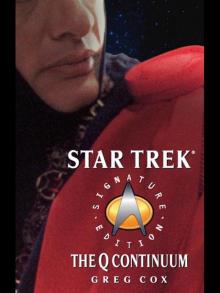 Q-Space
Q-Space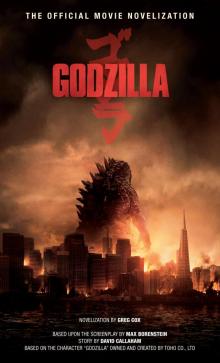 Godzilla - the Official Movie Novelization
Godzilla - the Official Movie Novelization War for the Planet of the Apes: Official Movie Novelization
War for the Planet of the Apes: Official Movie Novelization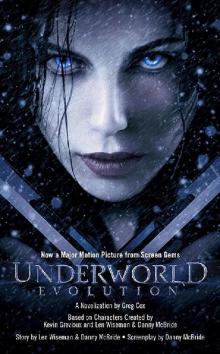 Underworld: Evolution
Underworld: Evolution Underworld
Underworld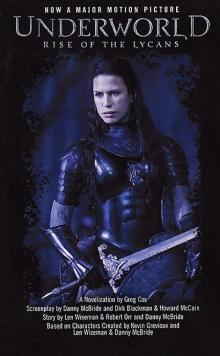 Rise of the Lycans
Rise of the Lycans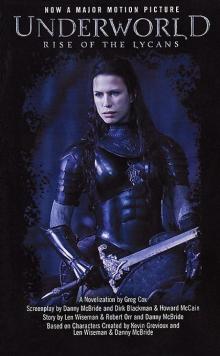 04 - Rise of the Lycans
04 - Rise of the Lycans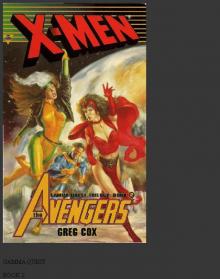 X-Men and the Avengers: Search and Rescue
X-Men and the Avengers: Search and Rescue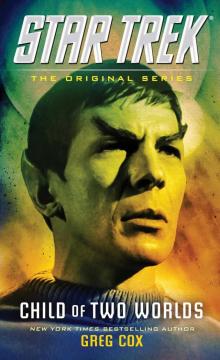 Child of Two Worlds
Child of Two Worlds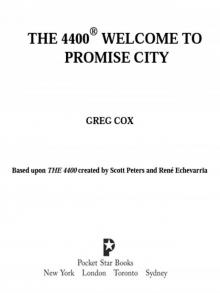 Welcome to Promise City
Welcome to Promise City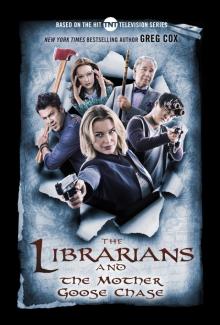 The Librarians and the Mother Goose Chase
The Librarians and the Mother Goose Chase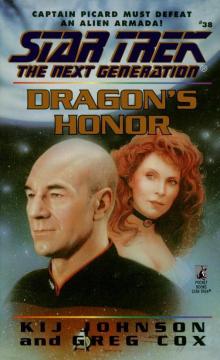 Dragon's Honor
Dragon's Honor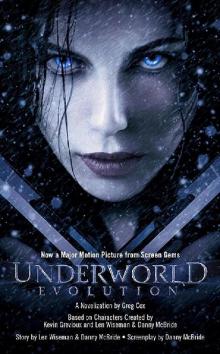 03 - Evolution
03 - Evolution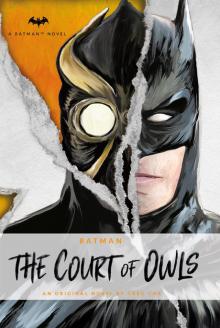 DC Comics novels--Batman
DC Comics novels--Batman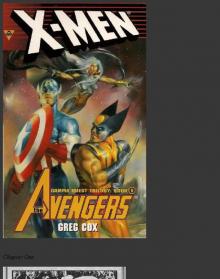 X-Men and the Avengers: Lost and Found
X-Men and the Avengers: Lost and Found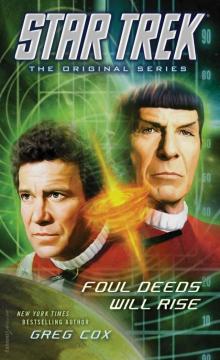 Foul Deeds Will Rise
Foul Deeds Will Rise 02 - Blood Enemy
02 - Blood Enemy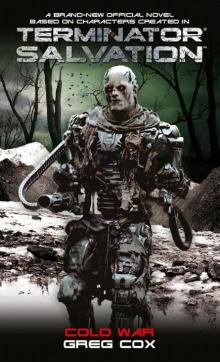 Terminator Salvation: Cold War
Terminator Salvation: Cold War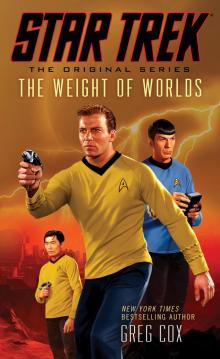 The Weight of Worlds
The Weight of Worlds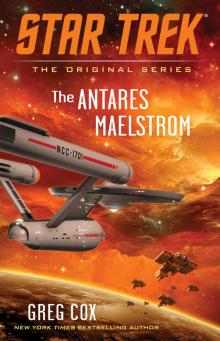 The Antares Maelstrom
The Antares Maelstrom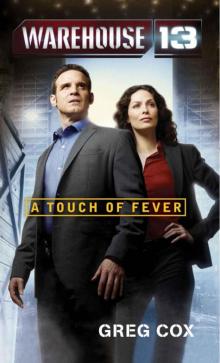 Warehouse 13: A Touch of Fever
Warehouse 13: A Touch of Fever Underworld: Blood Enemy
Underworld: Blood Enemy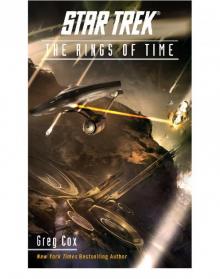 The Rise and Fall of Khan Noonien Singh
The Rise and Fall of Khan Noonien Singh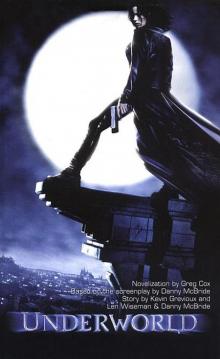 01 - Underworld
01 - Underworld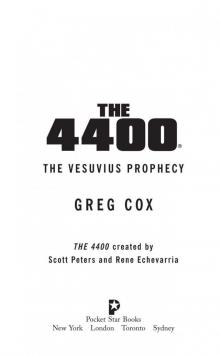 The 4400- the Vesuvius Prophecy
The 4400- the Vesuvius Prophecy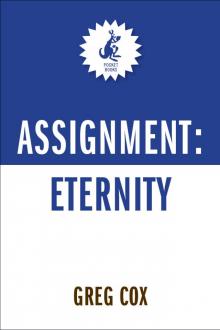 Assignment: Eternity
Assignment: Eternity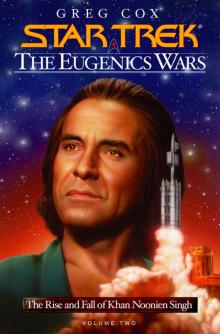 The Eugenics Wars, Vol. 2: The Rise and Fall of Khan Noonien Singh
The Eugenics Wars, Vol. 2: The Rise and Fall of Khan Noonien Singh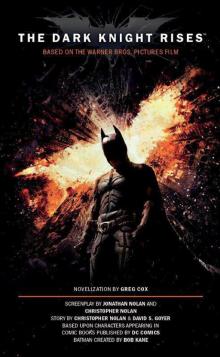 The Dark Knight Rises: The Official Novelization
The Dark Knight Rises: The Official Novelization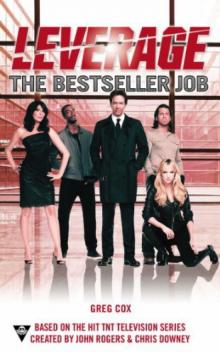 The Bestseller Job
The Bestseller Job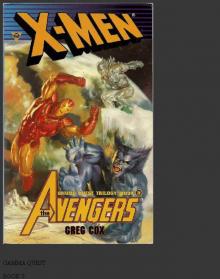 X-Men and the Avengers: Friend or Foe?
X-Men and the Avengers: Friend or Foe?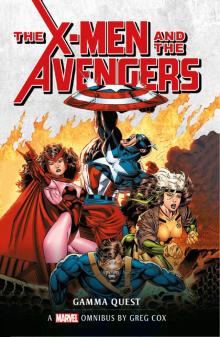 Marvel Classic Novels--X-Men and the Avengers
Marvel Classic Novels--X-Men and the Avengers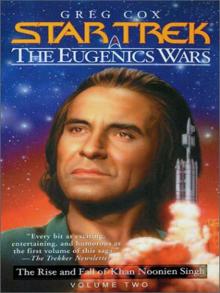 STAR TREK: TOS - The Eugenics Wars, Volume Two
STAR TREK: TOS - The Eugenics Wars, Volume Two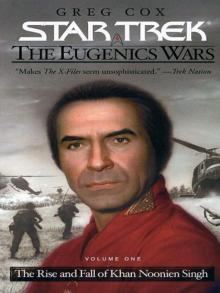 STAR TREK: TOS - The Eugenics Wars, Volume One
STAR TREK: TOS - The Eugenics Wars, Volume One The Black Shore
The Black Shore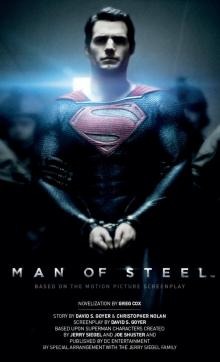 Man of Steel: The Official Movie Novelization
Man of Steel: The Official Movie Novelization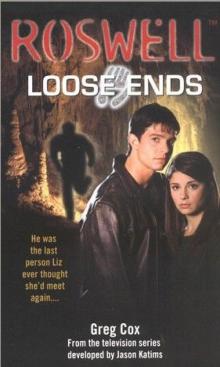 Loose ends r-1
Loose ends r-1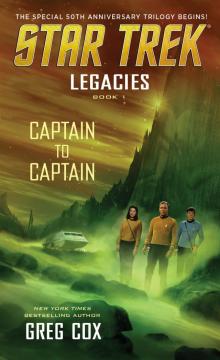 Legacies
Legacies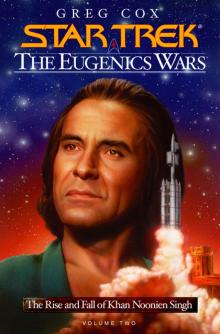 The Eugenics Wars, Volume Two
The Eugenics Wars, Volume Two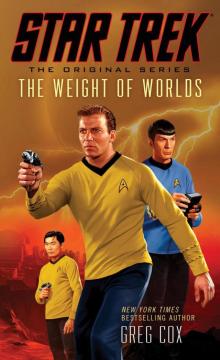 Star Trek: The Original Series - 148 - The Weight of Worlds
Star Trek: The Original Series - 148 - The Weight of Worlds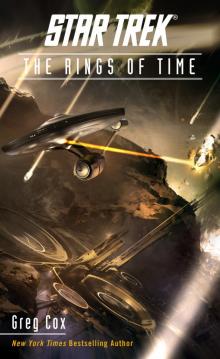 Star Trek: The Original Series: The Rings of Time
Star Trek: The Original Series: The Rings of Time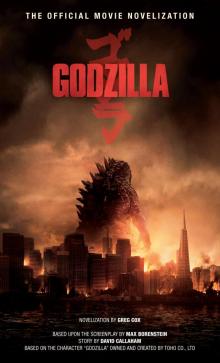 Godzilla--The Official Movie Novelization
Godzilla--The Official Movie Novelization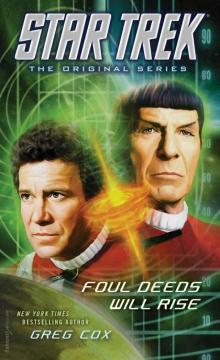 Star Trek: The Original Series - 160 - Foul Deeds Will Rise
Star Trek: The Original Series - 160 - Foul Deeds Will Rise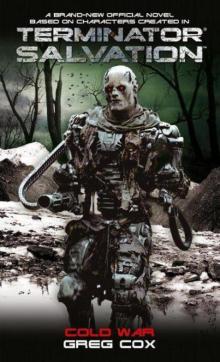 Terminator Salvation: Cold War ts-3
Terminator Salvation: Cold War ts-3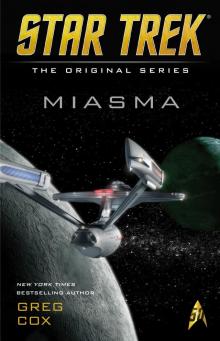 Star Trek: The Original Series: Miasma
Star Trek: The Original Series: Miasma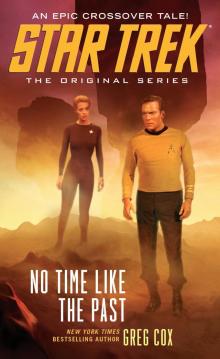 Star Trek: The Original Series: No Time Like the Past
Star Trek: The Original Series: No Time Like the Past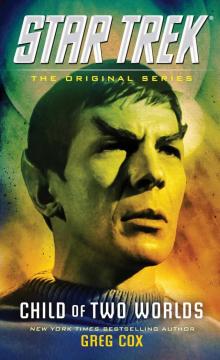 Child of Two Worlds (Star Trek: The Original Series)
Child of Two Worlds (Star Trek: The Original Series)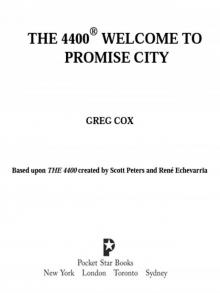 THE 4400® WELCOME TO PROMISE CITY
THE 4400® WELCOME TO PROMISE CITY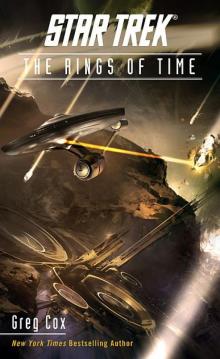 Star Trek: The Original Series: The Rings of Time (star trek: the original series)
Star Trek: The Original Series: The Rings of Time (star trek: the original series) To Reign in Hell: The Exile of Khan Noonien Singh
To Reign in Hell: The Exile of Khan Noonien Singh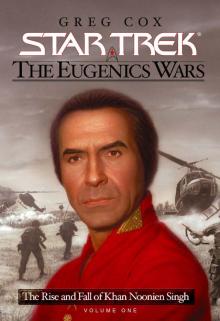 Star Trek: The Eugenics War, Vol. 1
Star Trek: The Eugenics War, Vol. 1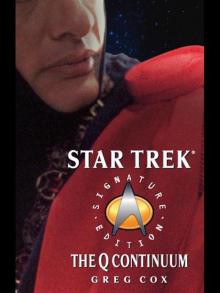 The Q Continuum
The Q Continuum